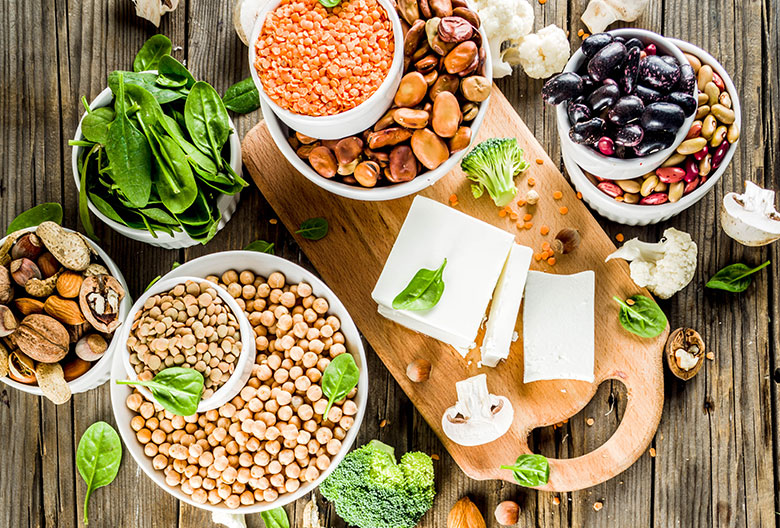At MedChefs we recommend a primarily plant-based dietary pattern and our members enjoy a range of meals types both omnivore and vegan. The choice of whether you consume animal products is personal, but paying attention to your values and to what makes you feel energized is worth exploring. Wherever you fall on the plant-based continuum, the key to success is to eat a variety of protein sources over the course of the week.
Often the concern with a strict plant-based diet is getting enough protein. Meeting daily protein requirements from plant sources does take a bit more time, attention and planning, but once you are aware of the many options you can easily meet your protein needs.
Here’s some basic information about protein:
- Its primary function is to provide structural and process elements for the body — everything from enzymes, molecules, tissues and organs. Important!
- Is there a right amount to have? That depends on your body size, type, activity, dietary preferences and age. We are very diverse in our needs. Sorry, no easy answer.
- As a baseline, healthy sedentary adults need about 0.8 grams of protein per kg of body mass. That’s about 55 g of protein per day for a 150 lb person. Or 72 g of protein per day for a 200 lb person. Athletes who are training hard will need more. People with certain conditions like kidney disease will need less.
- Just to give perspective, one chicken breast is around 54 grams of protein (7 g per oz for most animal proteins). The average person eating the typical Western diet is probably not protein deficient.
Here are some great sources of plant-based proteins. Note there are many more foods, but this list shows some of the higher sources.
Legumes
- Tofu 10 grams per ½ cup serving
- Tempeh 15 grams per ½ cup serving
- Lentils 17.9 grams per cup cooked
- Soybeans 17 grams per cup cooked
- Black Beans 15 grams per cup cooked
- Garbanzo Beans 14.5 grams per cup cooked
- Kidney Beans 15.3 grams per cup cooked
Grains
- Buckwheat 6 grams per cup cooked
- Barley 11 grams per cup cooked
- Brown Rice 7 grams per cup cooked
- Bulgur 6 grams per cup cooked
- Quinoa 8 grams per cup cooked
- Amaranth 12 grams per cup cooked
- Oatmeal 6 grams per cup cooked
Nuts and Seeds
- Hemp Seed 6.6 grams per 2 tablespoons
- Chia Seeds 4 grams per 2 tablespoons
- Pistachios 6 grams per 1/4 cup
- Nut Butters 8 grams per 2 tablespoons
- Tahini 8 grams per 3 tablespoons
- Walnuts 5 grams per 1/4 cup
Vegetables
- Artichokes 3.4 grams
- Broccoli 5 grams per cup
- Boiled Peas 8.5 grams per cup
- Baked Potato 4.3 grams
- Kale 3 grams per 1 cup chopped
Fruit
- Guava 4.2 grams per cup
- Pomegranate 4.7 grams per fruit
- Passion Fruit 5.1 grams per cup
The numbers really add up when you start combining — beans and grains, veggie Buddha bowls, nuts and seeds on your cereal. Nut butter on whole grain bread. The added benefits to plant-based protein are tons of fiber, vitamins and minerals. And, its better for the planet too!
Enjoy!
Randi

